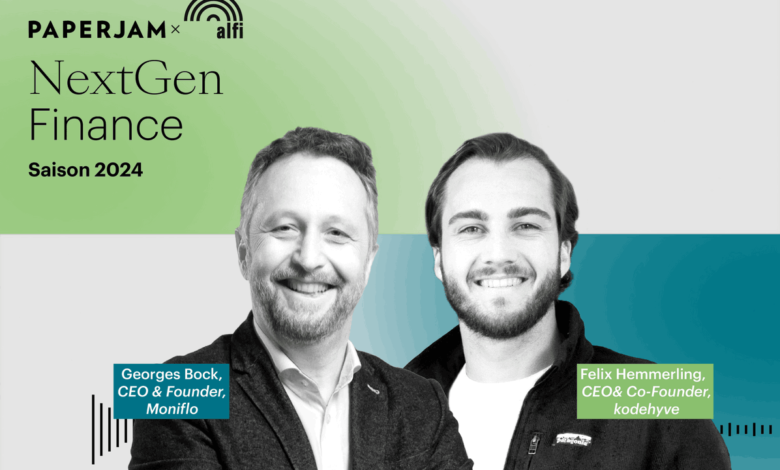The entrepreneurship dialogue | Paperjam News

Bock compares his career to climbing mountains: “I’ve already climbed several ones within KPMG, and my newest [one] to climb is Moniflo.” Focused on value-based investing, Moniflo uses a ranking system based on the UN’s sustainable development goals, and has announced internationalisation plans with a first focus on Germany.
During the conversation, Bock, who launched Moniflo’s earlier this year, and Hemmerling, who co-founded the real estate software company kodehyve in 2020 and recently announced the launch of their newest operating system , examine their definitions of entrepreneurship. Hemmerling considers himself as an entrepreneur “before I even knew it was a thing… I always wanted to let off my surplus of energy.” To him, being an entrepreneur means adding value to a certain group of people or a particular part of the world, building up from “truly nothing.”
Bock, explains that being an entrepreneur is also a lot about attitude: “An entrepreneur is something that you are at heart. An entrepreneur is somebody who doesn’t accept conditions around him and wants to change them for the better.”
An entrepreneur is somebody who doesn’t accept conditions around him and wants to change them for the better.
Evolution of the landscape
The landscape for entrepreneurs has undergone dramatic changes with the advent of digitalisation across all sectors, although progress has been somewhat slower in the finance industry, largely due to its highly regulated nature. According to Bock, there has been a significant shift over the past two decades, with banks transitioning from basic digital support to more advanced forms of communication and beyond.
However, Bock continues, “the biggest revolution that will come is the digital relationship. Neobanks and neobrokers have sourced, contracted and serve their clients 100% digitally. If you don’t manage the digital relationship with clients, you won’t be on the game list. “As business relations are not limited by geographic boundaries anymore and there are no physical limitations, there will be far more competition in the space”, he added.
Bock also sees information transparency as a key shift. Before, what could have been seen as banking advice that clients would previously have had to pay for, is today available for free. “Today, information is everywhere and the barriers to entry have never been lower.”
Hemmerling adds that tech triggered the creation of kodehyve, as he witnessed that the real estate sector was lagging behind other sectors when it came to technology.
The promotion of entrepreneurship has evolved significantly, even within a relatively short time frame. Reflecting on his experience from a decade ago, Hemmerling notes the prevalence of a ‘relentless hustle culture,’ particularly entrenched within specific sectors. However, he observes a noticeable shift in recent years, with entrepreneurs placing greater emphasis on personal well-being and mental health. According to him, the younger generation of entrepreneurs adopts a different mindset, valuing the autonomy and freedom inherent in entrepreneurship.
You still have a systemic problem in Luxembourg with young people comparing the career they could have in government or in the private sector… based on salary gaps that exist, especially at the early stage.
Nevertheless, he admits: “You still have a systemic problem in Luxembourg with young people comparing the career they could have in government or in the private sector… based on salary gaps that exist, especially at the early stage.”
Tips for success
Both Bock and Hemmerling agree that it’s critical to be surrounded by a good team. Nevertheless, for Hemmerling, the entrepreneurship journey is also an individual. While it might be similar to that of other entrepreneurs, it’s important to live one’s passion regardless whether others agree with that individual approach.
Bock also hopes young people will be encouraged to take a leap into the world of entrepreneurship, adding: “It’s not an easy journey, at times you’ll want to stop… you don’t do it because it is easy, you do it because it’s difficult.”
Listen to the full episode of The Finance NextGen podcast on the Alfi website:



